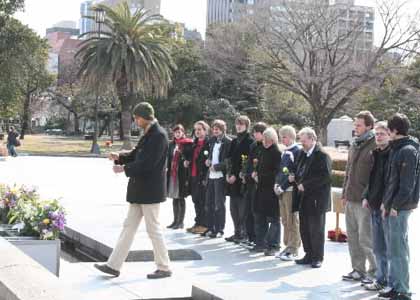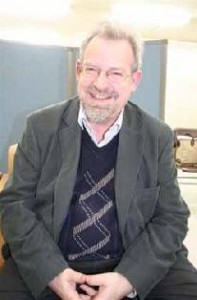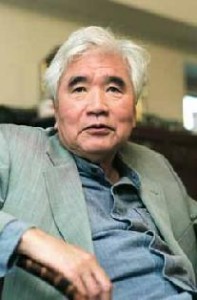German youths in Hiroshima, the peaceful legacy of Makoto Oda
Mar. 17, 2008
by Miho Kuwajima, Staff Writer
“Japan must persevere in its pacifism,” writer Makoto Oda stressed repeatedly before he died at the age of 75 last summer. Each time he offered this view, he mentioned the system of “conscientious objectors” in Germany where young people who refuse to take up arms for the military at age 18 can instead engage in community service activities. Mr. Oda said, “This sort of system enables citizens to actively contribute to a more peaceful world.”
Since September 2007, ten German youths who are conscientious objectors have been working in Japan as volunteers in lieu of their nation's mandatory military service. In February, these youths took part in a peace studies seminar in Hiroshima for five days.
This peace studies seminar was organized by Eugen Eichhorn, a professor at the University of Applied Sciences in Berlin. He worked with Mr. Oda to establish the German-Japanese Peace Forum Berlin in 1987.
“We, Japan and Germany, started the war with invasion and destruction,” wrote Mr. Oda in describing the German-Japanese Peace Forum Berlin. “And at last we lost the war which we both started, each of our countries experiencing misery.” Over the years, Mr. Oda and Mr. Eichhorn visited one another to hold exhibits on the atomic bombings and the holocaust and organize meetings of young people in Japan and Germany. Through these activities, they underscored the idea that no war is justified and pacifism must be firmly upheld.
In 1999, Mr. Eichhorn was asked by young conscientious objectors if he could help them find volunteer work in Japan. German conscientious objectors must be engaged in community service, such as working at nursing care facilities, for at least the same length of time as the country's military service.
At first, Mr. Eichhorn hesitated to become involved due to the complexity of the task, which included arranging for insurance and coordinating schedules. But Mr. Oda encouraged him, saying, “It will be wonderful! We'll bring many German youths to Japan. Japan can be a harbor for conscientious objectors who reject the military.”
Using the Working Holiday scheme, inviting German youths to Japan for community service became possible in 2001. Initially, only one site in Tokyo was available for work assignments, but now a number of places, from Hokkaido to Nagasaki, have joined the program. Baffo Koo Berma, 20, works at a nursing care facility in Takasaki City, Gunma Prefecture. He says, “I help the elderly at mealtimes and play a musical instrument for them called the ‘taishokoto.' Through these cross-cultural activities, I have a chance to take part in small efforts for peace every day.”
With the youths living in Japan for a whole year, Mr. Eichhorn felt that the participants had a good opportunity to learn even more. And so, starting this year, employing a provision of German law, he has decided to hold Japan-based seminars twice annually, with at least one of these seminars held in Hiroshima.
Although bringing the youths to Hiroshima from different parts of Japan requires time and money, Mr. Eichhorn says, “My activities with Mr. Oda are rooted in Hiroshima. Hiroshima is where young people can reflect on the meaning of peace.”
The first peace studies seminar consisted of an intensive five days, from February 19-23, with lectures and field trips from morning to night. On the third day, the participants spent an hour-long session with Akihiro Takahashi, 76, the former director of Hiroshima Peace Memorial Museum. Mr. Takahashi shared his experience of the atomic bombing with the group of youths.
“Why did the United States drop the atomic bombs, knowing that they were already winning the war?” said Balabas Roman, 20, who works at a peace museum in the city of Nagasaki. “Did they want to test how many people could be killed with their first atomic bombs?” This was a question he began to ponder in Nagasaki.
Maximilian Mittermuller, 20, who works at a foster-care facility in Sapporo, Hokkaido remarked, “I think continuing to develop nuclear weapons will lead to the suicide of the human race. When I become a high school teacher, I intend to tell my students about my experience of Hiroshima.”
Mr. Eichhorn added, “I felt the philosophy of the conscientious objector was always at the heart of Mr. Oda's thinking.” For September 2008, Mr. Eichhorn is planning to accept another 20 conscientious objectors for volunteer service in Japan. Needless to say, he hopes to continue bringing these youths to Hiroshima to study peace.
“Japan must persevere in its pacifism,” writer Makoto Oda stressed repeatedly before he died at the age of 75 last summer. Each time he offered this view, he mentioned the system of “conscientious objectors” in Germany where young people who refuse to take up arms for the military at age 18 can instead engage in community service activities. Mr. Oda said, “This sort of system enables citizens to actively contribute to a more peaceful world.”
Since September 2007, ten German youths who are conscientious objectors have been working in Japan as volunteers in lieu of their nation's mandatory military service. In February, these youths took part in a peace studies seminar in Hiroshima for five days.
This peace studies seminar was organized by Eugen Eichhorn, a professor at the University of Applied Sciences in Berlin. He worked with Mr. Oda to establish the German-Japanese Peace Forum Berlin in 1987.
“We, Japan and Germany, started the war with invasion and destruction,” wrote Mr. Oda in describing the German-Japanese Peace Forum Berlin. “And at last we lost the war which we both started, each of our countries experiencing misery.” Over the years, Mr. Oda and Mr. Eichhorn visited one another to hold exhibits on the atomic bombings and the holocaust and organize meetings of young people in Japan and Germany. Through these activities, they underscored the idea that no war is justified and pacifism must be firmly upheld.
In 1999, Mr. Eichhorn was asked by young conscientious objectors if he could help them find volunteer work in Japan. German conscientious objectors must be engaged in community service, such as working at nursing care facilities, for at least the same length of time as the country's military service.
At first, Mr. Eichhorn hesitated to become involved due to the complexity of the task, which included arranging for insurance and coordinating schedules. But Mr. Oda encouraged him, saying, “It will be wonderful! We'll bring many German youths to Japan. Japan can be a harbor for conscientious objectors who reject the military.”
Using the Working Holiday scheme, inviting German youths to Japan for community service became possible in 2001. Initially, only one site in Tokyo was available for work assignments, but now a number of places, from Hokkaido to Nagasaki, have joined the program. Baffo Koo Berma, 20, works at a nursing care facility in Takasaki City, Gunma Prefecture. He says, “I help the elderly at mealtimes and play a musical instrument for them called the ‘taishokoto.' Through these cross-cultural activities, I have a chance to take part in small efforts for peace every day.”
With the youths living in Japan for a whole year, Mr. Eichhorn felt that the participants had a good opportunity to learn even more. And so, starting this year, employing a provision of German law, he has decided to hold Japan-based seminars twice annually, with at least one of these seminars held in Hiroshima.
Although bringing the youths to Hiroshima from different parts of Japan requires time and money, Mr. Eichhorn says, “My activities with Mr. Oda are rooted in Hiroshima. Hiroshima is where young people can reflect on the meaning of peace.”
The first peace studies seminar consisted of an intensive five days, from February 19-23, with lectures and field trips from morning to night. On the third day, the participants spent an hour-long session with Akihiro Takahashi, 76, the former director of Hiroshima Peace Memorial Museum. Mr. Takahashi shared his experience of the atomic bombing with the group of youths.
“Why did the United States drop the atomic bombs, knowing that they were already winning the war?” said Balabas Roman, 20, who works at a peace museum in the city of Nagasaki. “Did they want to test how many people could be killed with their first atomic bombs?” This was a question he began to ponder in Nagasaki.
Maximilian Mittermuller, 20, who works at a foster-care facility in Sapporo, Hokkaido remarked, “I think continuing to develop nuclear weapons will lead to the suicide of the human race. When I become a high school teacher, I intend to tell my students about my experience of Hiroshima.”
Mr. Eichhorn added, “I felt the philosophy of the conscientious objector was always at the heart of Mr. Oda's thinking.” For September 2008, Mr. Eichhorn is planning to accept another 20 conscientious objectors for volunteer service in Japan. Needless to say, he hopes to continue bringing these youths to Hiroshima to study peace.










